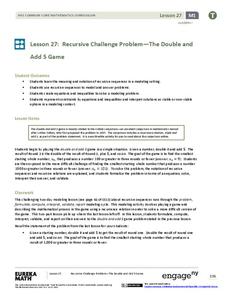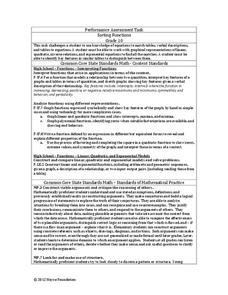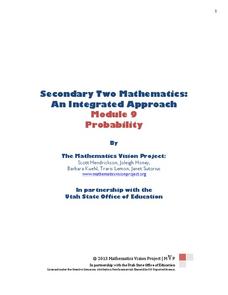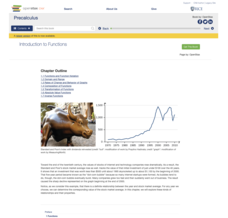West Contra Costa Unified School District
Arithmetic Series
Fall for a series. Learners determine how to find out how far a skydiver falls in the first 20 seconds. The Algebra II lesson introduces the idea of adding up the terms of an arithmetic sequence. Pupils learn how to use Sigma notation to...
Curated OER
What's Next?
Teach the class how to continue a given number pattern, and have them state a rule to explain their answer. Arithmetic sequences and related worksheets are used to reinforce the concept of numerical patterns using the nthterm.
EngageNY
Arithmetic and Geometric Sequences
Arithmetic and geometric sequences are linear and geometric patterns. Help pupils understand the relationship and see the connection with an activity that asks them to write the rules and classify the patterns correctly. A sorting...
K20 LEARN
Didn’t We Already Learn That Pattern? Functions/Arithmetic Sequences
Just how many toothpicks does the pattern take? After watching a video of someone building a pattern with toothpicks, groups create methods to find the number of toothpicks needed to accomplish that task. Groups either use explicit...
EngageNY
Integer Sequences—Should You Believe in Patterns?
Help your class discover possible patterns in a sequence of numbers and then write an equation with a instructional activity that covers sequence notation and function notation. Graphs are used to represent the number patterns.
101 Questions
Super Stairs
Keep your classes climbing in the right direction. Young mathematicians collect data from a video presentation. Using their data, they build an arithmetic sequence and use it to make predictions.
EngageNY
Recursive Formulas for Sequences
Provide Algebra I learners with a logical approach to making connections between the types of sequences and formulas with a lesson that uses what class members know about explicit formulas to develop an understanding of...
EngageNY
Recursive Challenge Problem—The Double and Add 5 Game
As a continuation of a previous lesson, this activity builds on the concept of calculating the terms of a sequence. Pupils are challenged to determine the smallest starting term to reach a set number by a set number of rounds. Notation...
Curated OER
Sequences
In this sequences worksheet, 6th graders solve and complete 3 different types of problems. First, they complete the missing numbers and determine the term-to-term rule. Then, students find the nth term of each sequence and draw the next...
Balanced Assessment
Local and Global Behavior
Create rules for numerical sequences. Pupils develop local rules and recursive rules for number sequences. The sequences are linear, quadratic, and cubic in nature. Scholars find that some local rules do not work, no matter where in...
Curated OER
Geometric & Arithmetic Patterns
Eighth graders explore sequences. They discuss the difference between an arithmetic sequence and a geometric pattern. Students participate in workstation activities where they determine arithmetic or geometric patterns and predict the...
Curated OER
Introduction to Arithmetic and Geometric Sequences
Students examine the concept of sequences. Students create a sequence using varied starting numbers, multipliers, and add on values. Students practice determining the starting values to use in order to produce a desired sequence.
Rice University
College Algebra
Is there more to college algebra than this? Even though the eBook is designed for a college algebra course, there are several topics that align to Algebra II or Pre-calculus courses. Topics begin with linear equation and inequalities,...
Curated OER
Converge or Diverge?
Learners prepare for the calculus concepts of limits by examining sequences that converge and diverge. By using an Excel program that generates sequences, students manipulate the starting number, multiplier and add-on values, and examine...
Curated OER
Arithmetic Patterns
Pupils experience math functions as they practice their addition and subtraction skills, and fill in each table based on a given rule. There are two columns in each of the four tables. The in column is already completed and...
Curated OER
Patterns Everywhere!
Learners recognize and demonstrate the patterning of numbers and objects in our environment. They create a pattern using geometric shapes and find a missing number in a sequence.
Inside Mathematics
Sorting Functions
Graph A goes with equation C, but table B. The short assessment task requires class members to match graphs with their corresponding tables, equations, and verbalized rules. Pupils then provide explanations on the process they used to...
Mathematics Vision Project
Probability
Probability, especially conditional probability, can be a slippery concept for young statisticians. Statements that seem self-evident on the surface often require a daunting amount of calculations to explicate, or turn out to be...
Inside Mathematics
Conference Tables
Pupils analyze a pattern of conference tables to determine the number of tables needed and the number of people that can be seated for a given size. Individuals develop general formulas for the two growing number patterns and...
Virginia Department of Education
Relationships Round Robin
Mathematics is all about patterns. Young mathematicians analyze geometric patterns to write algebraic expressions. They use the expressions to predict future stages of the patterns.
Mathematics Vision Project
Features of Functions
What are some basic features of functions? By looking at functions in graphs, tables, and equations, pupils compare them and find similarities and differences in general features. They use attributes such as intervals of...
Rice University
Precalculus
Take a step beyond Algebra 2. Learners use the eBook to learn concepts from the typical Precalculus course. Content starts off with a short review of functions in general and moves on to the basic functions, finishing up with more...
Curated OER
Algebraic Processes And Its Connections To Geometry
Youngsters explore number patterns within a Hundreds Chart. They discover six specific patterns from six teacher-directed rules in cooperative groups and describe in words ONE of the three patterns in their Learning Logs. They prove for...
Curated OER
Exam One Review
In this secondary mathematics instructional activity, students solve problems that involve patterns, arithmetic and geometric sequences, geometric logic and reasoning, and changing bases. The three page instructional activity...

























